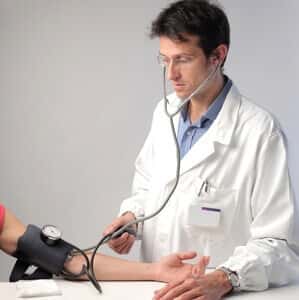
Are you looking for a diet that lowers blood pressure? Most healthcare practitioners would recommend the DASH diet. The acronym stands for Dietary Approaches to Stop Hypertension. Many studies have shown that people who follow this diet low in sugar and refined foods and high in vegetables, fruits and low-fat dairy products have lower blood pressure. Controlling the amount of sodium helps control blood pressure even better, in most cases. In fact, a recent study published in JAMA reported that a low-sodium diet reduced blood pressure about as well as commonly prescribed antihypertensive medications (JAMA, Dec. 19, 2023).
Restricting Sodium Lowers Blood Pressure:
More than 200 individuals, many with with high blood pressure, were randomized to either a high or a low-sodium diet for a week. At the end of that first week they switched to the opposite diet.
The low sodium diet provided about 500 mg of sodium daily and 4,500 mg of potassium from food. The high sodium diet contained at least 2,200 mg of sodium a day. (To achieve that, participants consumed two cups of bouillon, with 1,100 mg of sodium in each.)
On the low-sodium diet, three-fourths of the volunteers had lower systolic blood pressure. The average drop was about 8 points. However, a small fraction of the subjects actually had higher blood pressure on the low-sodium diet.
The authors conclude that
“sodium reduction significantly lowered BP in the majority of middle-aged to elderly adults in this study.”
Very Low Carb Diet That Lowers Blood Pressure:
Another study suggests that a very low carb diet is also quite effective.Researchers in Michigan recruited 94 heavy adults with high blood pressure and blood sugar (Annals of Family Medicine, May 2023). Half of them followed a very low-carb diet, while the other half followed the DASH diet. The study lasted four months. Those on the very low-carb diet limited their carbohydrate intake to no more than 35 g per day and tested their urinary ketones at least once a week. People following the DASH diet limited sodium intake and ate a variety of fruits and veggies.
Past studies have shown that the DASH diet lowers systolic blood pressure several points. In the current study, people on the DASH diet lowered their blood pressure by about 5 points. In comparison, those on the very low carb diet finished the study with blood pressure 10 points lower than baseline. Moreover, they lost almost twice as much weight and lowered their HbA1c values more.
Reader Tries Low Carb Diet for Blood Pressure:
Q. Several years ago my blood pressure was 210/100. I took the prescribed medication but also started reading up on ways to control hypertension naturally.
I read that low carbohydrate diets lower blood pressure, blood sugar and triglycerides. I cut back on bread, rarely eat pasta or other grains and don’t eat much fruit but do get lots of non-starchy vegetables. I eliminated sugar, and in the next few months my blood pressure dropped to about 120/80 even without meds.
I never cut back on salt and blood tests show my sodium is right where it should be. I suggest cutting carbs instead of salt.
My blood pressure is around 110/68 at home, but it still pops up to 140/80 at the doctor’s office. I take my monitor with me so my doctor can check my recent readings and test it against her meter.
Science Supports Reader’s Approach:
A. Bravo! Your low-carb dietary approach works for losing weight, lowering cholesterol and controlling blood sugar. There is some evidence to support your use of this approach for hypertension and weight control (American Journal of Clinical Nutrition, Nov. 2009).
It is very sensible for you to monitor your blood pressure at home. Many people find that their blood pressure is higher during an office visit, particularly if there is some anxiety associated with the visit. This is called “white coat hypertension.”
We discuss white coat hypertension and many non-drug approaches to controlling hypertension in our Guide to Blood Pressure Treatment. The DASH diet, although it is not low in carbohydrates, is one approach that is very well supported by evidence. If you need to learn more about the DASH diet, you can find lots of information online or in our book, The People’s Pharmacy Quick & Handy Home Remedies.
Citations
- Gupta DK et al, "Effect of dietary sodium on blood pressure: A crossover trial." JAMA, Dec. 19, 2023. DOI: 10.1001/jama.2023.23651
- Saslow LR et al, "Comparing very low-carbohydrate vs DASH diets for overweight or obese adults with hypertension and prediabetes or Type 2 diabetes: A randomized trial." Annals of Family Medicine, May 2023. DOI: https://doi.org/10.1370/afm.2968
- Delbridge EA et al, "One-year weight maintenance after significant weight loss in healthy overweight and obese subjects: does diet composition matter?" American Journal of Clinical Nutrition, Nov. 2009. DOI: 10.3945/ajcn.2008.27209

